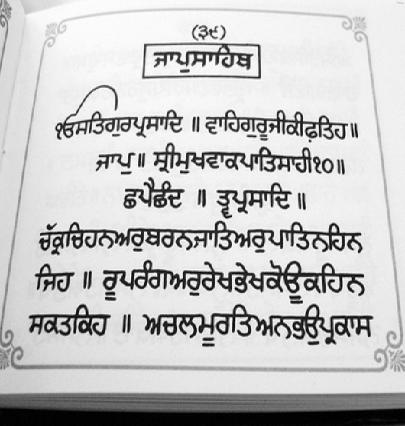
Jaap Sahib is the morning prayer of the Sikhs. The Prayer or Bani was composed by the tenth Sikh Master, Guru Gobind Singh. This Bani is one of 5 Banis that a Sikh must recite everyday and is recited by the Panj Pyare while preparing Amrit on the occasion of Amrit Sanchar (initiation), a ceremony held to admit initiates into the Khalsa. The Jaap Sahib is chronologically the first Bani (holy hymn of Guru) in the Dasam Granth, which is said to have been compiled by Bhai Mani Singh around the year 1734. The Jaap Sahib is reminiscent of Japji Sahib, and is chronologically recited at second, in the daily morning prayer of a Sikh.
Form
Jaap Sahib is made up of 199 pauris or verses and is the first Bani of the Dasam Granth (p. 1-10). The Jaap Sahib begins with "Sri Mukhwakh Patshahi Dasvee", "By the holy mouth of the Tenth King". This appears to be a specific saying to authenticate the writings of Guru Gobind Singh himself.
Macauliffe says, "The Hindus have a work enitled Vishnu Sahasar Nam, 'Vishnu's Thousand Names.' The Jaapji was composed to supply the Sikhs with a similar number of epithets of the Creator."
Jap is a Sanskrit word meaning "to utter in a low voice, whisper, mutter (especially prayers or incantations); to invoke or call upon in a low voice". The form of the word here is Japu, which makes it a noun, "meditation".
Language
The language of Jaap, is close to classical with words and compounds drawn from Sanskrit, Brij Bhasha, Arabic and Urdu. The contents of Jaap Sahib, are divided into various Chhands bearing the name of the related meter according to the then prevalent system of prosody in India.
Jaap Sahib is a total and complete introduction to a non-individual Creator, or Nature itself, or the Forces of Universe, or the Laws of Nature.
The verses are in the form of rhymed couplets and the vocabularly and ingenuity are superb. The opening verse is typical:
"Thou hast no form or feature, No caste or lineage; None can describe Thy appearance, Color, mark or garb."
There is an all inclusiveness and universalism that keeps coming to the surface. "All" seems to be the key word.
"Thou art the source of all light, And the object of all praise; Thou art the supreme Lord of all, And the moon of the Universe." -Verse 119
"Perfect is Thy discernment. All turn to Thee for refuge. Thou art the Great Companion; Thou art the sure Providence." -Verse 123
The fervor of the true Bhakta comes out in hailing the immortal as man's companion. Something of the devoutness of the Guru's nature comes to a climax in the concluding verse:
"Thou fillest and feedest the whole universe, Thyself self-existent, auspicious and united with all. Thou art the embodiment of mercy; Thou art the deliverer from birth and death. Thou art man's constant Companion. Everlasting is Thy glory!"
Among the thousand names there are seventy-five Muslim names. Only a few of these, such as Rahim and Karim, Razakai (Nourisher), Aruv (Pardoner), and Salamai (Peaceful) are among the Muslim's ninety-nine names of Allah: but all the names used would be familiar to Punjabi Muslims. The Muslim tongue and ear would surely delight in Allah and Nirsharik; Karimur Rahim; Husnul Chirag, Garibun Niwaz; Kamal Karim; Rajak Rahim; Bahistun Niwas; and many such others.
Content
The immortal One is for Guru Gobind Singh sometimes the 'wholly Other,' far above human comprehension, before whom man can but bow again and again. As the succeeding waves of negative attributes roll on one may well wonder how there can be any communication with this inscrutable Being. The answer is, of course, that He of his grace has offered companionship to man, so that man does not have to understand, but only to accept and adore. Sikhism offers a new path of salvation in addition to the traditional paths of knowledge, work and devotion - the path of the Name, Naam. Meditation on the Name produces Wismad, wonder; and the object of such poetry as the Japp Sahib is the creation of the mood of aesthetic ecstasy: Sher Singh in the Philosophy of Sikhism writes: "It is the poetry and the music of the contents of the Granth revealing simple and direct truths which charm a reader of Gurbani ... and can bring peace to the soul." "It is the aesthetical insight leading man through appearance to reality." Meditation on the Name is fundamental to Sikhism, and so in this opening hymn of the Dasam Granth, men are given a thousand names on which to meditate.
Jaap Sahib - Audio recording, read by Bhai Jarnail Singh
Jaap Sahib (Fast) - Fast audio recording, read by Bhai Jarnail Singh